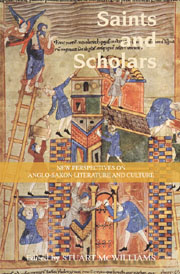 Saints and Scholars
Saints and Scholars Book contents
- Frontmatter
- Contents
- List of Contributors
- Abbreviations
- Introduction
- I Hagiography and the Homiletic Tradition
- II Aspects of Community and Consumption
- 8 Stories from the Court of King Alfred
- 9 De Duodecim Abusiuis, Lordship and Kingship in Anglo-Saxon England
- 10 Reluctant Appetites: Anglo-Saxon Attitudes towards Fasting
- 11 A Note on the Function of the Inscribed Strip from the Staffordshire Hoard
- 12 The Shining of the Sun in the Twelve Nights of Christmas
- 13 Sin and Laughter in Late Anglo-Saxon England: The Case of Old English (h)leahtor
- 14 Marginal Activity? Post-Conquest Old English Readers and their Notes
- III Reflections on Old English Scholarship
- Poems
- Hugh Magennis: A Bibliography, 1981–2011
- Index
- Tabula Gratulatoria
10 - Reluctant Appetites: Anglo-Saxon Attitudes towards Fasting
from II - Aspects of Community and Consumption
Published online by Cambridge University Press: 05 February 2013
- Frontmatter
- Contents
- List of Contributors
- Abbreviations
- Introduction
- I Hagiography and the Homiletic Tradition
- II Aspects of Community and Consumption
- 8 Stories from the Court of King Alfred
- 9 De Duodecim Abusiuis, Lordship and Kingship in Anglo-Saxon England
- 10 Reluctant Appetites: Anglo-Saxon Attitudes towards Fasting
- 11 A Note on the Function of the Inscribed Strip from the Staffordshire Hoard
- 12 The Shining of the Sun in the Twelve Nights of Christmas
- 13 Sin and Laughter in Late Anglo-Saxon England: The Case of Old English (h)leahtor
- 14 Marginal Activity? Post-Conquest Old English Readers and their Notes
- III Reflections on Old English Scholarship
- Poems
- Hugh Magennis: A Bibliography, 1981–2011
- Index
- Tabula Gratulatoria
Summary
Food in literature is never just sustenance, but carries a raft of cultural meaning. It is as a result of Hugh Magennis's prolific work on feasting and consumption in Old English literature and related Germanic texts that we understand the rich symbolism of food and drink in the culture of the Anglo-Saxons. I first met Hugh at the Leeds Medieval Congress as a fledging academic and he has been a most kind and supportive mentor over the years. Hugh in his meticulous and scholarly manner has left little that can be added to the topic of eating or drinking in Old English literature. I therefore want to cover the area of non-consumption in this essay, most loosely defined as ‘fasting’. I want to show that the absence of food can also have a powerful symbolism. Most of this symbolism is, of course, rooted in the Christian tradition of the Anglo-Saxon writer, and it makes sense to look first at the traditions of fasting inherited by the Anglo-Saxons, before I examine the different areas in which fasting was practised.
Whether the pagan Anglo-Saxons fasted, and if so, in what context, is unknown. Our knowledge of fasting is limited to the Christian period, and even here mostly to the late Anglo-Saxon period. We should therefore be conscious that we are looking at fasting mainly in a Christian ritual context. For the majority of Anglo-Saxons, fasting would mean abstention from certain foods, such as meat or alcohol, during the fixed fasting periods such as Lent, Rogationweek or Advent, or simply not eating outside prescribed mealtimes.
- Type
- Chapter
- Information
- Saints and ScholarsNew Perspectives on Anglo-Saxon Literature and Culture in Honour of Hugh Magennis, pp. 164 - 186Publisher: Boydell & BrewerPrint publication year: 2012


